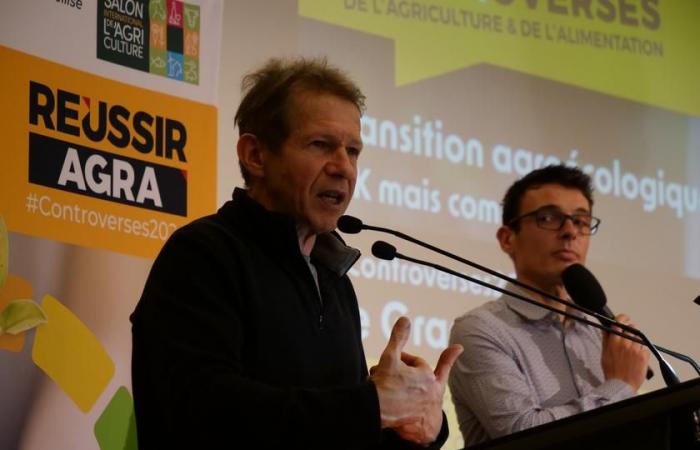Decarbonization think tank founded by Jean-Marc Jancovicithe Shift project produced this November 28 its first report on the climate transition of agriculture to 2050. A report on food will be released next year. 18 months were necessary as well as the contribution of 300 people, enriched by 6 months of major consultation of farmers (which gathered more than 7700 responses).
Read also: “Producing cleaner and cheaper: an impossible equation for farmers” according to Jean-Marc Jancovici
Four scenarios proposed for agriculture, including a “more realistic” one called “conciliation”
At the end of this work, 4 scenarios are proposed with the constraint of respecting the decarbonization objectives of the agricultural sector as defined by the SNBC 2 namely reaching 48 MtCO2 eq ofdirect emissions for the sector by 2050 (compared to 74.2 in 2021-2022 including 44 from livestock).
A potential path to decarbonization and resilience for the agricultural sector
Among these 4 scenarios, the Shift project offers a “ conciliation scenario », « realistic ”, presented as “ a potential path to decarbonization and resilience for the agricultural sector », the 3 other scenarios (for “better national agricultural and food autonomy”, “better national energy independence” and “contribution to global food security”) failing to achieve the decarbonization objective and generating too many vulnerabilities for agriculture.
Read also: The Shift Project by Jean-Marc Jancovici launches its work for “resilient, low-carbon and prosperous agriculture”
What structuring hypotheses to decarbonize French agriculture?
For this conciliation scenario, the Shift project proposes by 2050:
- A extensification of the breedingwith 90% preservation of permanent meadowsa decline of 15% in the enteric fermentation for ruminants and reduction in workforce : 20% for poultry and the pig (with decarbonization of animal feed), 30% for dairy cattle25% for beef cattle (-1% of livestock per year, which is less than the actual decline) and 20% for sheep and goats.
- A tripling of surface areas in legumesparticularly in soya, combined with a generalization of plant cover (surface area multiplied by 8) and an increase in the volumes of methanization digestates to reduce the use of mineral fertilizers.
- THE semis directs on 80% of the surfaces,agriculture bio on 25% of surfaces
- A 10-fold increase inagroforestry intraparcel
- A production of bioenergy multiplied by three to reach 65 TWh consumed by the agricultural sector and 160 TWh intended for other sectors of activity.
- A drop in the energy consumption by farmerss of 21% with better energy efficiency and systemic changes in practices and decarbonization of buildings and agricultural machinery (with theelectrification of a third of tractorsanother third using biogas and the last third of biofuels).
Read also: SNBC 3: how agriculture can reduce its carbon emissions by 10 Mt by 2030 according to the government?
Levers to be activated in a coordinated and anticipated manner
« To achieve the objective set by the national low carbon strategywe must activate all the levers in a coordinated and ambitious manner », comments Laure Le Quéré, expert agricultural engineer from Shift Projectduring the presentation of the report this morning to the press.
The scenario favored by the Think Tank would also make it possible to reduce indirect emissions from agriculture (7 Mt COe eq would be saved just by reducing the use of mineral fertilizers).
« The need for anticipation is crucial », continues the engineer who emphasizes that the decarbonization of the equipment fleet will necessarily take time.
Read also: Decarbonization: “Agriculture is the most complex sector we have ever had to look at” recognizes Jean-Marc Jancovici who appeals to farmers
“Farmers are ready to act,” says the Shift Project
« THE farmers are ready to act, we must give them the means », Comments the Shift Project team who worked on the report. 80% of farmers who responded to the consultation said they were worried about the viability of their farm, particularly in the face of climate issues, and only 7% responded that they did not want to engage in the transition.
On the other hand “ 87% set an economic condition to commit to or accelerate the transition » underlines Laure Le Quéré, expert agricultural engineer from the Shift Project.
Read also: “We will have to deglobalize agriculture” according to Jean-Marc Jancovici
Necessary support from territories and agricultural and economic policies
For his scenario to come true, “ we need the support of territorial levels and agricultural and economic policies at national and European level », underlines Corentin Biardeau-Noyers, Agriculture project engineer at The Shift Project.
« We will have to secure the profitability of the transition, assume an increase in agricultural production costsact simultaneously on demand and supply and favor incentive measures », continues Celine Corpelagricultural project manager at the Shift Project part-time and farmer (in Aisne on a large crop farm, partly organic with agroforestry).
We cannot ask farmers to produce less, cleaner and for less money. Few people agree to be harakiri
« We cannot ask the farmers to produce less, cleaner and cheaper. Few people agree to be harakiri. The community, if it wants farmers to produce meat in less quantity, and to make efforts to produce cleaner – which will impact economic returns – it should pay for that. There are two ways: ecosystem services paid for by public authorities; or else a specification which will include the price to the consumer », explains for his part Jean-Marc Jancoviciinterviewed by our colleagues from Agra Presse.
Read also: Interview with JM. Jancovici: “Sober agriculture is organized regionally”
Report conclusions debated by agricultural unions
The Shift project emphasizes having worked with the planning secretariat to produce this report, the conclusions of which will be detailed this Thursday, November 28 in the evening, followed by a debate moderated by Jean-Marc Jancovici in the presence of Laurence Marandolaspokesperson for the Peasant Confederation, Véronique Le Floc'hpresident of Rural Coordination, and Olivier Daugeradministrator at FNSEA.
Read also: Jean-Marc Jancovici: “we need to bring money back into the agricultural sector”






